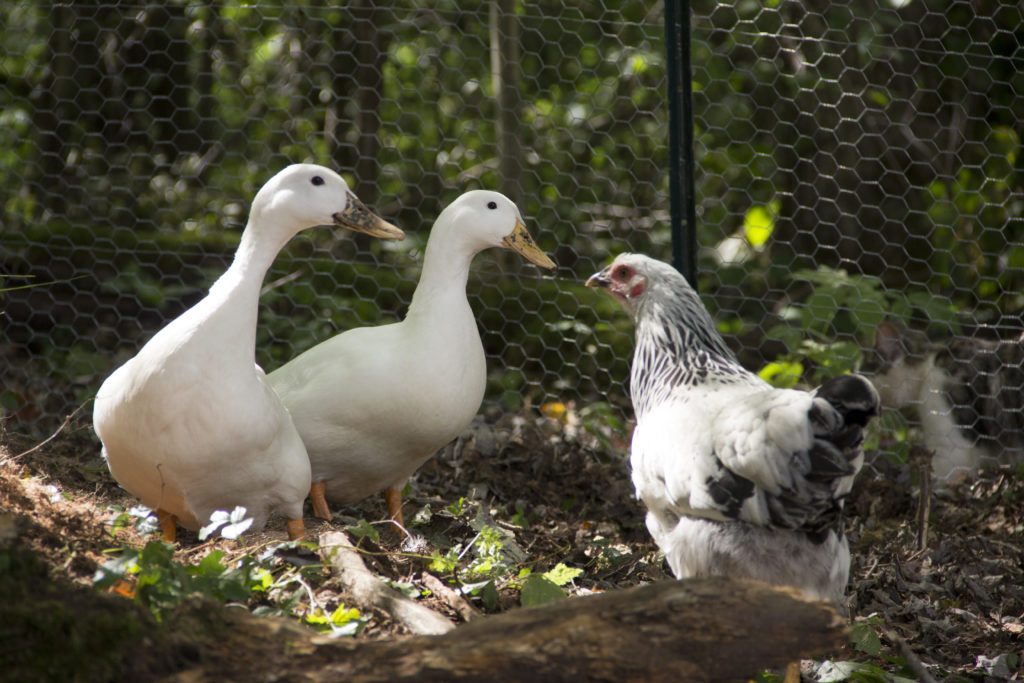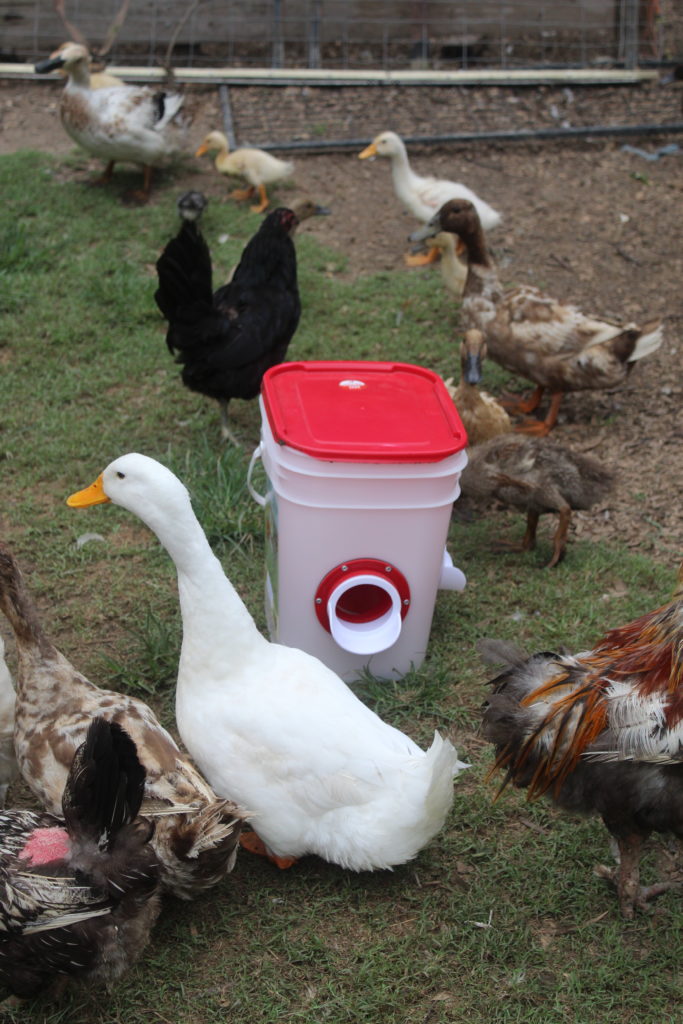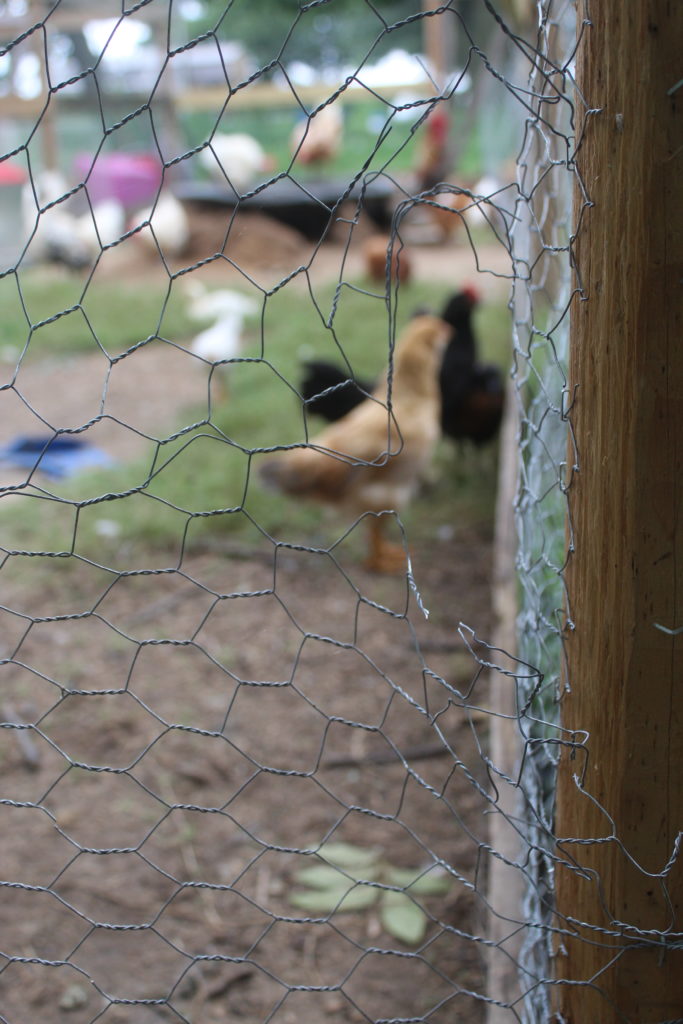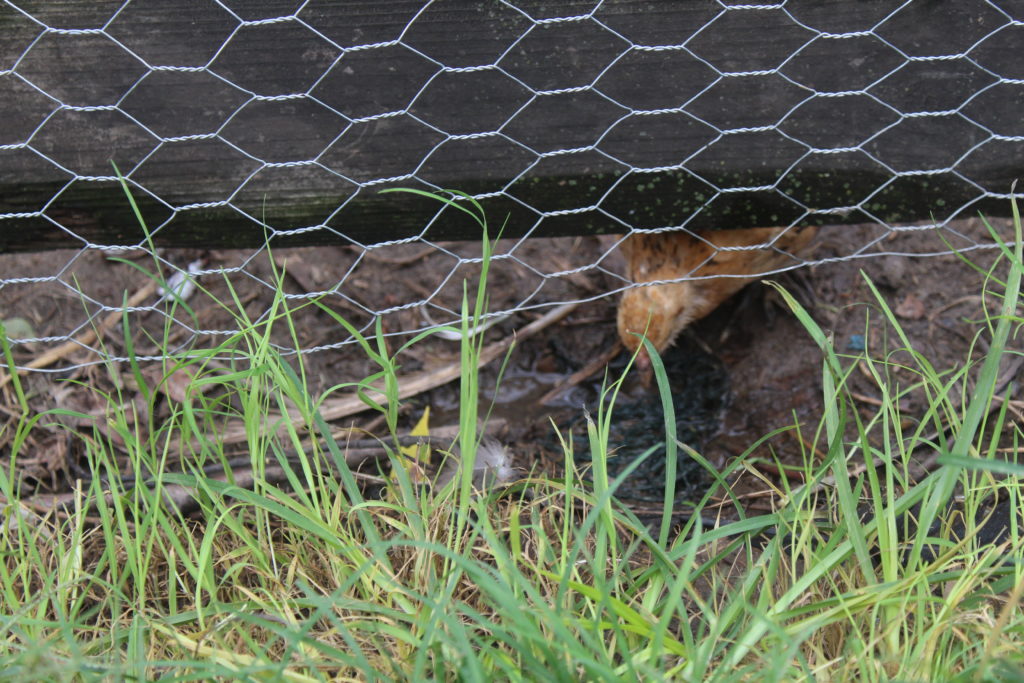From circumventing coyotes to outsmarting opposums, Maat van Uitert has 7 practical suggestions to protect ducks from predators.
We used to think we just had a couple of predators on our farm, until I put out a game camera one night. Boy, were we wrong! Even if you think your flock is safe, you might be surprised. Plus, it’s better to be safe than sorry!

Ducks, Brahma hen… and sneaky cat in the background. Getty Images
When creating a “duck safety plan,” remember that ducks aren’t chickens. While hens and roosters can perch, run quickly, and fly into tree branches, most domestic duck breeds (except Muscovies) can’t do any of that. They can swim out into ponds and other bodies of water, but in most domestic settings, they don’t have that option. So you’ll need to take a few extra precautions to keep your fowl friends from harm. Here’s a list of eight battle-tested strategies to keep quackers safe that have worked on my farm for years.
1. Keep feed (and your ducks) locked up at night
Consider this your first line of defense. Nothing is more attractive to predators than an easy meal, which includes your ducks’ feed. Scavengers, such as opossums and raccoons, are attracted to the sweet and sometimes overpowering smell of livestock feed, and a midnight raid on your feeder can easily turn into an opportunity to attack your flock!
Using an automatic feeder that stays in the coop (we love Duncan’s Poultry feeders) or one that locks when not in use, such as Grandpa’s Feeders, are a good idea. You can also craft your own DIY feeder.

Plastic feeders like this are easy to remove from the coop at night. Photo by author.
Similarly, making sure your ducks are bundled up tight in their coop at dusk is another way to avoid losing your flock. We’ve trained our ducks to go into their coop at sundown by offering treats only at this specific time. Your ducks might be confused for the first couple of days, but they’ll get the hang of it very quickly. Be sure your birds eat up all the protein-rich treats, though, as they can also attract predators.
2. Use a predator-safe coop
Predators are smart, strong, and determined. No coop is 100 percent safe, but there’s a lot that you can do to fortify your coop and keep them out most of the time.
Assess your coop and fencing regularly. Look for gaps between fencing and the ground, which can develop over time as the ground settles. Check over all of the fencing for any spots where predators might have been trying to get in, and reinforce those areas.

Gaps like this in your fencing are an open invitation to predators. Photo by author.
Secure doors and windows. Because ducks are hardy creatures that get excited and want to play during rain or snow storms, it’s tempting to give them a run with a simple duck house and forget to lock them up every night. However, it’s important to provide them with a home that can completely shut out predators. All windows should lock or have tight-fitting wire that covers the opening. Similarly, doors should shut completely and lock. Double-check your doors and windows for small cracks that wily weasels or minks can wiggle through. If you can see daylight, fix it! Rubber guards and weather stripping work great, and are available at most hardware stores.
Our ducks are very clever, and discovered they can open unsecured doors by running toward them and pushing on them. While an evening stroll toward their pond might seem like a good idea, it’s also an open invitation for a predator to sneak into their coop at midnight. But their round bills can’t open a lock! Just make sure the lock is high enough that a raccoon can’t reach it.
Make sure your coop is heavy or staked to the ground. I see lots of beautiful duck coops out there, but most look pretty easy to overturn for a large and determined domestic dog, wolf, or bear. (You might think that bears aren’t common predators, but I get at least one email a month from a reader who lost their flock to a grizzly or black bear.)
We use a large coop that’s essentially a huge garden shed, and it’s impossible for any animal to overturn it. But if your coop isn’t very heavy, secure it to the ground with 4×4 posts, rebar, or your own favorite method. One tip I love is to use 8-foot landscape timbers. They’re inexpensive, and work just as well as 4×4 posts. Screw the posts horizontally to the base of your coop, leaving about a foot sticking out on each side of the coop. Bend a piece of rebar to form a “U.” Place the rebar over the ends of the posts so that a leg of the rebar U is on either side of the post, and then hammer the rebar into the ground. Think of the rebar as a giant staple that secures the post to the ground.
3. Sink hardware cloth into the ground to stop wandering ducks
“Hardware cloth” refers to any open mesh fencing, such as galvanized square mesh. You’re probably already using hardware cloth on your flock’s coop and run. For some extra protection against digging predators, including domestic dogs and foxes, embed an extra few feet of hardware cloth or chicken wire into the ground on the outside of your coop and run.
While it might seem an obvious way to keep predators out of your coop, it’s also a handy way to keep your ducks in their protected zone. Ducks are naturally curious, especially if there’s a tempting puddle just asking to be splashed in or a garden waiting to be plucked of slugs. Sometimes, the temptation is too much, and your ducks will refuse to stay put if they can find a way out of their run.

Your ducks and chicks can easily escape their coop if your fencing has gaps like this. Photo by author
To keep them contained, dig a 12- to 24-inch-deep trench around your coop and run, and make it the same width as your hardware cloth. The depth is up to you and your individual situation. On our farm, we go with a 12-inch depth, but we don’t have very aggressive predators. If you have determined predators, 24 inches might be a better option.
The key is to make sure the sunken hardware cloth is an extension of the wall itself, and not a separate piece. This ensures carnivores can’t dig under your coop or run wall and that your ducks can’t wiggle through and explore your yard at their peril.
4. Install motion sensor lights or strobe lights to scare off predators
Using a motion sensor light or a light that turns on and off at random intervals is another option to protect your ducks. We’ve used them successfully on our farm to keep coyotes and foxes at bay. Predators that aren’t used to human presence, such as wolves and coyotes, can be frightened by a sudden flash of light. If your coop doesn’t have electricity, you can find solar powered options that range in price from $12 to $200.
You can also find products that flash strobe lights, such as Predator Guard. Strobe lights can work better for animals used to human company, such as raccoons and skunks, because they find the strobe visually confusing and disorienting.
5. House your ducks with a large animal
This idea won’t work for every farm, but if you have goats, donkeys, alpacas, or llamas, they can do double duty and protect your flock from smaller predators, such as raccoons, skunks, or opossums. We’ve kept our ducks with our goats for years (they’re famous on Instagram), and I swear we haven’t lost any ducks because the goats keep predators at bay. Think about it; predators don’t want a fight. They’re opportunists; if they think a larger critter will make it difficult to get a meal, they’ll look elsewhere.
6. Use a radio or other sound maker
Some products on the market use ultrasonic waves to deter an unwanted visitor. These waves can’t be detected by humans, but can be felt by predators, similar to a dog whistle. These can be a great option if you live in a suburban area and your neighbors might not appreciate a motion-sensored light going off at all hours. Many of these products are solar powered, and reasonably priced.

Using a radio or Bluetooth speakers and app to play a radio. Photo by author.
Turning on music, a podcast, or talk radio is another low-cost option that can be effective. Most predators prefer to lurk around at night when they won’t be disturbed by humans. But if they think a person is nearby, they’ll find another meal for the night. You might also find that music or talk radio relaxes your flock and reduces stress.
You can also go really low-tech and hang noisemakers on the fence: something that will jangle and startle a sneaking predator, such as bells or cans.
7. Test-drive a “pricker”
This method might not be for everyone, but it’s worth mentioning. Prickers are plastic strips with small spikes that protrude. They don’t trap predators; instead, they just make the area unappealing to walk on. Don’t worry: While they’ll repel predators, they won’t harm them, since a coyote or other carnivore will only need to touch them one time before they head the other direction.
These are some practical and low-cost suggestions to keep your birds as safe as possible from hungry predators. Do you have a favorite way to repel unwanted predators on your farm? Leave a comment.
Maat van Uitert is the founder of the backyard chicken and duck blog Pampered Chicken Mama, which reaches approximately 20 million backyard poultry enthusiasts every month. She’s also the founder of the Living The Good Life With Backyard Chickens store, which carries nesting herbs, feed, and treats for chickens and ducks. You can catch up with Maat on Facebook and Instagram.













6 Comments
pigs also work to scare off foxes because if a fox go’s near or past them they make sure i know .
I also house my ducks with my goats but how do you get around the goats eating the duck food?
We have acquired muscovky ducks on our street. One laid eggs about a week-10 days ago. She’s been faithful sitting on it. The nest is under my oak covered with ferns but today I had opened eggs all over the yard. It’s too early for hatching. How do I protect them if she lays again?
When I built my first chicken coop, I knew I had quite a few predators, so I covered the windows on the outside with 1/2 inch square hardware cloth. I cut it a few inches too big for the window , after attaching it ,I turned the edge back toward the window, but not all the way. This left all the sharp edges sticking out, so if the predator tried to step on the window sill, he got his feet poked. I also had an electric automatic door. It worked great until we had a power outage, then it did its own thing and opened or closed whenever. I also had my door raised up about 6 inches from the coop floor, this kept the straw inside the coop and not under the door.I had a couple solar motion lights, and trail cams. I kept my feed in galvanized garbage cans inside the coop, and kept all feeders inside the coop. In the winter, I used a electric water heater. To keep the water cleaner, I put the water heater on top of a couple 8 inch high cement blocks.
A good set of australian shepherds are also great. They ward of predators, and herd the ducks to safety many times without being told.
My problem is ravens. For years they have entered my poultry barn a stolen almost all of my bird’s eggs – turkey, goose, guinea, duck, and chicken. Last year they started grabbing our goslings and ducklings. A scarecrow in the barn worked for awhile , as long as I move it every two days, or so. I have one raven who sits outside on a telephone pole and warns the bird in the barn when I try to sneak up on it with my shotgun. I tried hiding inside, but they don’t come around as long as I am in the barn. My husband built a blind and tried sitting in it, but that didn’t work either. My birds are loose (except at night) on about 1 1/2 acres of land, so I can’t cover the area.
Ravens may be beautiful and intelligent, but they sure are a pain where you don’t want it.